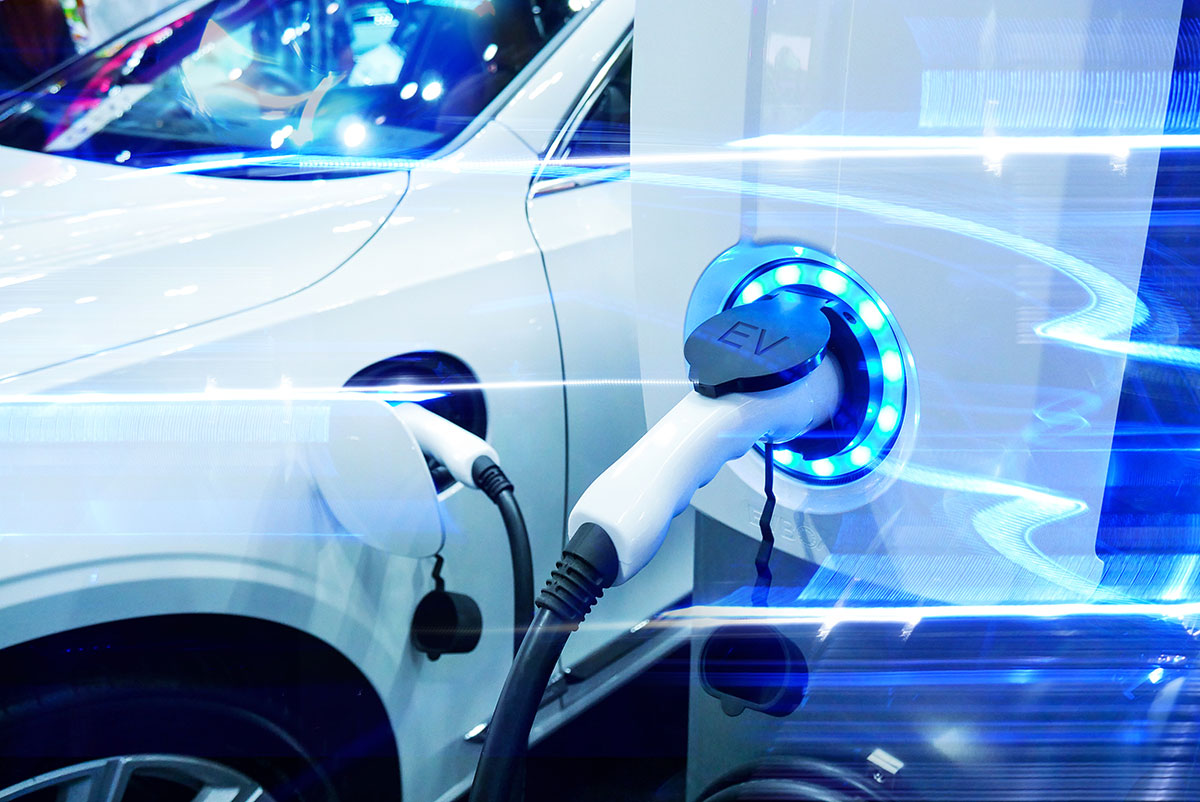ڈان کی ایک رپورٹ کے مطابق حکومت نے جنوری 2020ء سے الیکٹرک وہیکل (EV) پالیسی کے اجراء اور اس کو عملی صورت میں نافذ کرنے کا فیصلہ کر لیا ہے۔ یہ قدم اس امر کےباوجود اٹھایا جا رہا ہے کہ آٹو سیکٹر کی جانب سے اس کی سخت مزاحمت کی جا رہی ہے۔ EV پالیسی کو نومبر 2019ء میں وفاقی کابینہ کی جانب سے منظوری ملی تھی۔ آئندہ جمعرات کو وزارت ماحولیاتی تبدیلی (MoCC) ایک بین الوزارتی اجلاس کی صدارت بھی کر رہی ہے جو ملک میں EV پالیسی کے نفاذ پر گفتگو کرے گا۔ قبل ازیں MoCC نے سرکاری اداروں اور وزارتوں کو ہدایت دی کہ EV پالیسی جنوری 2020ء سے نافذ کرنے کی ضرورت ہے۔ وزارت کے الفاظ کچھ یہ ہیں:
“NEVP کو اقتصادی تعاون کمیٹی (ECC) کے رعایتی پیکیج کی توثیق کے ذریعے جنوری 2020ء سے نافذ کرنے کی ضرورت ہے۔”
وزیر اعظم پہلے ہی عہدیداروں کو دو اور تین پہیوں والی گاڑیوں اور بسوں جیسی پبلک ٹرانسپورٹ کے لیے EV پالیسی پر عمل درآمد کرنے کی ہدایت کر چکے ہیں۔ EV پالیسی اسموگ جیسے ماحولیاتی مسائل سے نمٹنے کے لیے بنائی جارہی ہے۔ ماحولیاتی مسائل جیسا کہ آلودگی کو ختم کرنا موجودہ حکومت کے ایجنڈے کا حصہ ہے۔ اس کے لیے وزیر اعظم اور وفاقی کابینہ کی ہدایت پر MoCC کے ذریعہ EV پالیسی پر عمل درآمد کیا جا رہا ہے۔
بین الوزارتی کمیٹی اس پالیسی کے دفعہ 8 کے مطابق ہے۔ اس دفعہ کے تحت کمیٹی میں ماہرینِ تعلیم ، وفاقی وزارتیں اور نجی شعبے کے اراکین شامل ہوں گے۔ اس بین الوزارتی کمیٹی کو الیکٹرک گاڑیوں کی پوری ویلیوچَین کا جائزہ لینے کا کام دیا جائے گا۔ اس سے حکومت کو پاکستان میں EVs کی مقامی سطح پر تیاری کو بہتر بنانے کی ترغیب دینے میں مدد ملے گی۔ مقامی سطح پر EVs کی تیاری سے ان کی ملک میں فروخت سستی قیمت پر ہوگی اور بعد از خریداری ان کی مرمّت کافی سستی پڑے گی۔
کمیٹی EV سیکٹر میں احکامات کی تعمیل، معیار بندی اور ضابطہ سازی جیسے معاملات پر بھی فیصلہ کرے گی۔ EV پالیسی کے نفاذ کے بعد بھی کمیٹی کا کام جاری رہے گا۔ کمیٹی نئی ٹیکنالوجیاں سامنے آنے اور وقت کے ساتھ ساتھ مارکیٹ کے بدلنے کے ساتھ پالیسی میں ترامیم بھی تجویز کرے گی۔ اس لیے EV پالیسی کے نفاذ اور طویل المیعاد کامیابی دونوں کے لیے بین الوزارتی کمیٹی کا کام بہت اہمیت کا حامل ہے۔
تاہم ، آٹو سیکٹر نئی EV پالیسی کا خیرمقدم نہیں کررہا ہے۔ اس نے نومبر 2019ء میں منظوری کے بعد سے ہی EV پالیسی کی مخالفت شروع کر دی تھی کیونکہ حکومت کی جانب سے اہم اسٹیک ہولڈرز کے خدشات پر غور نہیں کیا گیا تھا۔ پاکستان آٹوموٹو مینوفیکچررز ایسوسی ایشن (پاما) نے کہا:
“ہمیں جمعرات کو بین الوزارتی اجلاس میں مدعو نہیں کیا گیا۔ ہمیں قومی الیکٹرک وہیکل پالیسی (NEVP) پر بھی اعتماد میں نہیں لیا گیا۔”
PAMAنے کہا تھا کہ جب 5 نومبر کو وفاقی کابینہ نے پالیسی کو منظور کیا تھا اُس وقت وہ انجینئرنگ ڈیولپمنٹ بورڈ (EDB) کے ساتھ EV پالیسی کی دفعات پر تبادلہ خیال کر رہا تھا۔ PAMAکے مطابق حکومت نے EVs کی سمت میں بڑا قدم اس وقت اٹھایا ہے جب آٹو سیکٹر کی موجودہ صورت حال بہت خراب ہے۔ وزارتِ موسمیاتی تبدیلی نے پالیسی مسودہ پہلے ہی تیار کر لی تھی جبکہ آٹو سیکٹر کے اسٹیک ہولڈرز کے ساتھ ضروری مشاورت کی جا رہی تھی اور اُن سے رائے لی جا رہی تھی۔
اسٹیک ہولڈرز کی خواہش تھی کہ وزارت صنعت و پیداوار (MoIP) اس معاملے کو سنبھالے اور 23 مئی 2019ء کو EBD کی زیر صدارت اجلاس میں اپنے خدشات کا اظہار کیا۔ PAMA کے لیے یہ دیکھنا غیر معمولی اور حیرت انگیز تھا جبکہ EBD کے ساتھ ان کے مذاکرات جاری تھے اور MoCC نے پالیسی خلاصے کا مسودہ تیار کرکے اسے پیش کر دیا۔ حکومت کو چاہیے کہ EV پالیسی کو طویل عرصے تک کامیاب رکھنے کے لیے تمام اسٹیک ہولڈرز کو اعتماد میں لے۔ یہ آٹو سیکٹر کی ترقی کے لیے مناسب ہوگا اور اِس وقت ملک میں کام کرنے والے ادارے بھی کچھ اپنی پروڈکٹ پورٹ فولیو میں کچھ الیکٹرک گاڑیاں شامل کرنے کی کوشش کریں گے۔
اس سے پہلے پٹرولیم ڈویژن کے لیے وزیر اعظم عمران خان کے خصوصی مشیر ندیم بابر نے بھی کہا تھا کہ موجودہ حکومت پاکستان میں توانائی کے منظرنامے میں انقلاب برپا کر چکی ہے۔
EV پالیسی کے تحت دو اور تین پہیوں والی 1,00,000 سے 5,00,000 گاڑیوں کو الیکٹرک پر منتقل کیا جائے گا۔ الیکٹرک کار مینوفیکچرنگ پلانٹس کی سہولیات دینے کے لیے خصوصی اقتصادی زونز کو منظوری بھی دی گئی ہے۔ یہ پلانٹس ٹیکس رعایت اور دیگر سہولیات سے بھی لطف اندوز ہوں گے تاکہ بجلی سے چلنے والی گاڑیوں کی پیداواری لاگت کم کی جا سکے۔
اس کے علاوہ پاکستان میں الیکٹرک کاریں متعارف کروانے کا ایک بڑا فائدہ یہ بھی ہے کہ ملک کو تیل کی درآمدات میں سالانہ 2 ارب ڈالرز کی بچت ہوگی، موسمیاتی تبدیلی پر وزیر اعظم کے مشیر ملک امین اسلم نے بتایا۔
مزید یہ کہ کچھ ہفتے پہلے پاکستان الیکٹرک وہیکلز اینڈ پارٹس مینوفیکچررز اینڈ ٹریڈرز ایسوسی ایشن (PEVPMTA) امین اسلم نے اعلان کیا کہ کراچی میں مقامی آٹوموبائل مینوفیکچررز نے الیکٹرک گاڑیوں کی کنورژن کِٹس تیار کر لی ہیں۔ ان کے مطابق اس کِٹ کی مدد سے عام انجن کی حامل موٹر سائیکل کو بجلی پر کنورٹ کرنے کی لاگت 20,000 سے 35,000 روپے ہے۔ تاہم تین پہیوں والی گاڑیوں یا کاروں کی صورت میں اس لاگت میں اضافہ ہوگا یعنی اس کا انحصار گاڑی کی اقسام پر ہے۔
مزید خبروں کے لیے آتے رہیے اور EV پالیسی اور اس کے نفاذ کے حوالے سے اپنی رائے نیچے تبصروں میں پیش کیجیے۔


